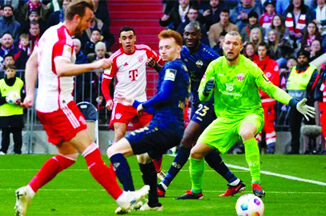
New Delhi (TIP)- A high-level committee led by former president Ram Nath Kovind on Thursday, March 14, unanimously backed simultaneous polls for the Lok Sabha, state assemblies, and local bodies, state and local tiers and called for a raft of constitutional amendments to achieve the goal, potentially setting the stage for the far-reaching but controversial reform that can reshape the world’s largest democracy.
The eight-member committee submitted its 18,626 page-long report to President Droupadi Murmu on Thursday morning, outlining a phased approach to synchronise elections, beginning first with Lok Sabha and state legislative assemblies, and following up with local body polls within 100 days. “Simultaneous polls will help save resources, spur development and social cohesion, deepen the foundations of democratic rubric and help realise the aspirations of India, that is Bharat,” the report said.
“Simultaneous elections will bring fundamental transformation in the electoral process and overall governance. It will result in optimising scarce resources and also encourage voters to participate in the electoral process in larger numbers,” the panel added.
To be sure, simultaneous elections do not mean that voting across the country for the three tiers of government must take place on a single day. “In a country as large as India, it is not possible to have that. Pragmatism requires elections to be held in phases,” clarified the panel.
The proposal was welcomed by the Bharatiya Janata Party (BJP). “It is a historic day for the country’s democratic system,”Union home minister Amit Shah said in a post on X.
The Opposition, led by the Congress, said the recommendations could hurt democracy.
“How can there be One Nation, One Election when the current regime is not accepting the people’s mandate? Also, it’s against the spirit of decentralisation of the panchayats and everything else. So let’s see what the recommendations are,” Congress leader Priyank Kharge said. From the first elections in Independent India in 1952 until 1967, elections were held simultaneously across the country. But since the Lok Sabha and state assemblies can be dissolved before their tenures end, the state and national elections came to be held at different times after that. Several committees, including a parliamentary panel, the Niti Aayog and the Election Commission of India, have studied simultaneous polls in the past, backing the idea but flagging logistical concerns.
The report said that the panel – set up by the Union government on September 2, 2023 — received responses from 47 political parties, with 32 favouring simultaneous elections. These parties — which include the BJP, the Biju Janata Dal (BJD), Janata Dal United (JDU) and the Shiv Sena — said the proposal will save scarce resources, protect social harmony, and stimulate economic development. However, 13 political parties opposed simultaneous elections — including Congress, BSP, Aam Aadmi Party, CPI(M) —expressing concerns that it could violate the basic structure of the Constitution, be anti-democratic and anti-federal, marginalise regional parties, encourage the dominance of national parties, and lead to a presidential form of government. Source: HT




Be the first to comment